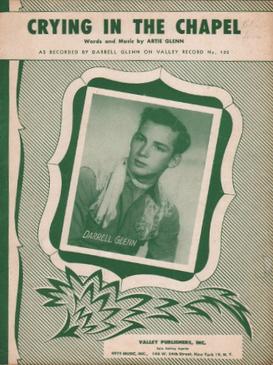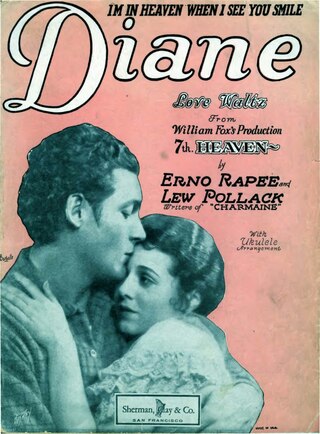Related Research Articles
"Ebb Tide" is a popular song written in 1953 by the lyricist Carl Sigman and composer and harpist Robert Maxwell. The first version was sung by Vic Damone backed by Richard Hayman's orchestra. The highest-selling version was released by the Righteous Brothers in 1965.
"If I Give My Heart to You" is a popular song written by Jimmy Brewster, Jimmie Crane, and Al Jacobs. The most popular versions of the song were recorded by Doris Day and by Denise Lor; both charted in 1954.
"Wanted" is a popular song written by Jack Fulton and Lois Steele. A recording by Perry Como was the most popular version, reaching No. 1 in the US. Al Martino also recorded a version which reached No. 4 in the UK.
"Hey There" is a show tune from the musical play The Pajama Game, written by Richard Adler and Jerry Ross. It was published in 1954. It was introduced by John Raitt in the original production. In the show, Sid sings it to a recording device, telling himself that he's foolish to continue his advances to Babe. He plays the tape back, and after responding to his own comments, sings a duet with himself.
"Let Me Go, Lover!", a popular song, was written by Jenny Lou Carson and Al Hill, a pen name used by Fred Wise, Kathleen Twomey, and Ben Weisman. It is based on an earlier song called "Let Me Go, Devil", about alcoholism.
"Why Don't You Believe Me?" is a popular song written by Lew Douglas, King Laney, and Roy Rodde and published in 1952.
"I Believe" is a popular song written by Ervin Drake, Irvin Abraham, Jack Mendelsohn and Al Stillman in 1953. The most popular version was recorded by Italian-American singer Frankie Laine, and spent eighteen weeks at No. 1 on the UK Singles Chart.
"Till I Waltz Again with You" is a popular song written by Sid Prosen.
"Teach Me Tonight" is a popular song that has become a jazz standard. The music was written by Gene De Paul, the lyrics by Sammy Cahn. The song was published in 1953.
"Cherry Pink and Apple Blossom White" or "Cerezo Rosa" or "Ciliegi Rosa" or "Gummy Mambo", is the English version of "Cerisiers Roses et Pommiers Blancs", a popular song with music by Louiguy written in 1950. French lyrics by Jacques Larue and English lyrics by Mack David both exist, and recordings of both have been quite popular.
"It's Almost Tomorrow" is a 1955 popular song with music by Gene Adkinson and lyrics by Wade Buff. The song was actually written in 1953, when Adkinson and Buff were in high school. Hit versions were released in 1955 by The Dream Weavers, Jo Stafford, David Carroll, and Snooky Lanson.
"The Breeze and I" is a popular song.

"Crying in the Chapel" is a song written by Artie Glenn and recorded by his son Darrell Glenn. The song was released in 1953 and reached number six on the Billboard chart.
"In the Chapel in the Moonlight" is a 1936 popular song written by Billy Hill, and first performed by Shep Fields.
"When a Child Is Born" is a Christmas song, with a melody taken from the 1970 song "Tränen lügen nicht" by Michael Holm. The English lyrics were written a few years later by Austrian composer Fred Jay as a Christmas song. Versions of the song have been recorded by Michael Holm in 1974, Johnny Mathis, whose version was the 1976 Christmas number one in the UK, and Boney M, who included it on their hit 1981 Christmas Album.
"If I Didn't Care" is a song written by Jack Lawrence that was sung and recorded by the Ink Spots featuring Bill Kenny in 1939.

"Diane" is a song by Ernö Rapée and Lew Pollack, and was originally written as a theme song for the 1927 silent movie 7th Heaven. Its musical composition entered the public domain on January 1, 2023. The song title is sometimes mistakenly referred to as "My Diane" or confused with the Beach Boys song "My Diane", which is a different song.
"I'll Be Home" is a 1955 song that was written by Ferdinand Washington and songwriter, Stan Lewis.
"Ciribiribin" is a merry Piedmontese ballad, originally in three-quarter time, composed by Alberto Pestalozza in 1898 with lyrics by Carlo Tiochet. It quickly became popular and has been recorded by many artists. Decades later it enjoyed continued popularity with swing and jazz bands, played in four-four time.
"Eternally" is a song with music by Charlie Chaplin, and words by the English lyricists Geoff Parsons and John Turner. The music was initially composed for Chaplin's film Limelight (1952) and titled "Terry's Theme"; the film won an Oscar for "Best Original Dramatic Score" at the 45th Academy Awards in 1973.
References
- 1 2 3 4 Rice, Jo (1982). The Guinness Book of 500 Number One Hits (1st ed.). Enfield, Middlesex: Guinness Superlatives Ltd. p. 15. ISBN 0-85112-250-7.
- ↑ Roberts, David (2006). British Hit Singles & Albums (19th ed.). London: Guinness World Records Limited. pp. 35–6. ISBN 1-904994-10-5.
- ↑ Whitburn, Joel (2013). Joel Whitburn's Top Pop Singles, 14th Edition: 1955-2012. Record Research. p. 194.